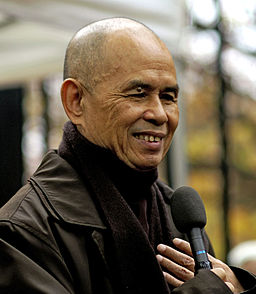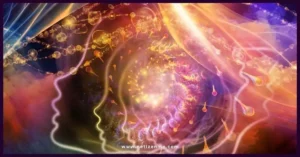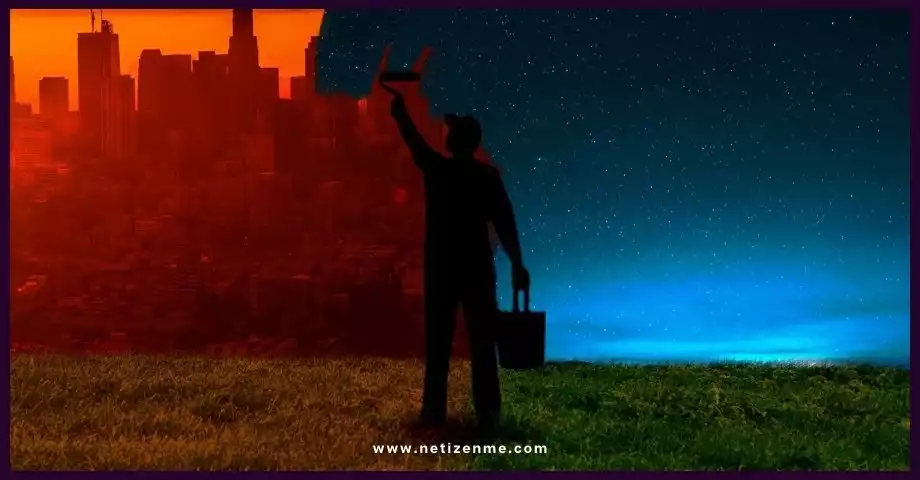
The Vietnamese Buddhist Zen monk Thich Nhat Hanh
Thich Nhat Hanh was a Buddhist monk and a philosopher of the modern era who was born in central Vietnam in October 1926. He joined the monastery at Tu Hieu Temple in Vietnam at the age of sixteen and was ordained at the age of 23. Thich Nhat Hanh studied both Mahayana Buddhism and Vietnamese Thien Buddhism. He is called the father of mindfulness by many. The popular television host Oprah Winfrey referred to him as “one of the most influential spiritual leaders of our times.”
What did Thich Nhat Hanh teach?
- Teaching mindfulness and compassion
As a believer in “deep listening,” during an interview with Oprah Winfrey (2012), he once said that “deep listening might even allow us to resolve significant conflicts that lead to war or terrorism.”
The Times magazine (Hue, 2019) writes an impressive piece about him. “He famously taught that we could all be Bodhisattva by finding happiness in the simple things—in mindfully peeling an orange or sipping tea. “A Buddha is someone enlightened, capable of loving and forgiving,” he wrote in Your True Home, “You know that at times you are like that. So enjoy being a Buddha.”
His influence has spread globally. Christiana Figueres, the former executive secretary of the U.N. Framework Convention on Climate Change, said in 2016 that she could not have pulled off the Paris Agreement “if the teachings of him had not accompanied me”. World Bank president Jim Yong Kim called Nhat Hanh’s Miracle of Mindfulness as his favorite book.
The metaphysics of Thich Nhat Hanh
The metaphysics of the Vietnamese Buddhist monk Thich Nhat Hanh is based on the belief that everything is connected. This means that everything in the universe is interdependent and interconnected. This includes all living beings, as well as inanimate objects. All things are connected through what he calls “the great web of life.”Thich Nhat Hanh believes that this interconnectedness is what gives rise to compassion.
When we see ourselves as being connected to all other beings, we naturally feel compassion for them. This is because we realize that their suffering is our suffering and their joy is our joy. We are all in this together. This understanding of the interconnectedness of all things can help us to deal with difficult situations in our own lives.
When we realize that we are not alone, that we are connected to others who are experiencing the same thing, it can give us strength and hope. Knowing that we are all in this together can help us find solutions to our problems and make positive changes in our lives.
Read Also: Paulo Freire: One Of The Most Influential Brazilian Philosophers
Check the references below to know more about Thich Nhat Hanh
Hue, A. V. F. (2019, January 24). The monk who taught the world mindfulness awaits the end of this life. Time
OWN. (2012, May 6). Thich Nhat Hanh on compassionate listening | SuperSoul Sunday | Oprah Winfrey network.
Staff, L. R. (2021, October 12). The best of Thich Nhat Hanh: Life, quotes, and books – lion’s roar. Lion’s Roar.
- Thomas Jefferson’s Thoughts On Learning

- Paulo Freire: One Of The Most Influential Brazilian Philosophers

- Bruno, The Penguin, And The Grandfather Paradox

This article is written by:
Our professional writers and editors are passionate about sharing high-quality information and insights with our audience. We conduct diligent research, maintain fact-checking protocols, and prioritize accuracy and integrity to the best of our capacity.
You can cite our articles under the author name "Netizenme"








